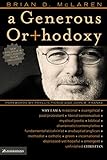A Generous Orthodoxy
By Brian McLaren
Grand Rapids, MI: Zondervan, 2004
Review by Carl McColman
 Here's a book that gets the amazing-subtitle award. See if you can repeat this three times fast: A Generous Orthodoxy: Why I am a missional, evangelical, post/protestant, liberal/conservative, mystical/poetic, biblical, charismatic/contemplative, fundamentalist/calvinist, anabaptist/anglican, methodist, catholic, green, incarnational, depressed-yet-hopeful, emergent, unfinished Christian. What a mouthful!
Here's a book that gets the amazing-subtitle award. See if you can repeat this three times fast: A Generous Orthodoxy: Why I am a missional, evangelical, post/protestant, liberal/conservative, mystical/poetic, biblical, charismatic/contemplative, fundamentalist/calvinist, anabaptist/anglican, methodist, catholic, green, incarnational, depressed-yet-hopeful, emergent, unfinished Christian. What a mouthful!I'm delighted to say that the book is as good as its title is long.
McLaren is a non-denominational (perhaps Matthew Fox's neologism "post-denominational" would be more apt) minister who pastors a large church in Maryland; he comes out of the evangelical world and so shares the sensibility and lingo of the born again community, but with a clear appreciation for philosophy, culture, science and liberal values — values that sometimes puts him at odds with the evangelical mainstream even while enabling him to articulate a truly visionary statement of how the church might find new ways to express fidelity to Christ in the postmodern world. A Generous Orthodoxy is a confessional work in which McLaren gives voice to his own faith, and in doing so provides inspiration for the faith of anyone who is seeking an authentic expression of Christianity for our time.
There are many jewels in this book, but perhaps the single most valuable one, to my mind, is McLaren's audacious declaration that "Protestant" needs to be re-defined: away from protest, and toward pro-testifying. In other words, one of the weaknesses of Protestant Christianity (and therefore, of evangelicalism) has been its core identity of protest: protesting the abuses of late medieval catholicism; then protesting the rise of secularism, and — sadly, all too often — protesting other "protestantisms," as the various denominations of Protestant Christianity have attacked one another with a same zeal that inspired the initial 16th-century break with Rome. Of course, the problem with protesting, is that it leads to a culture that is defined more by what it is against rather than what it is for. As a consequence, people outside of Christianity tend to see the religion in terms of its prohibitions: no extramarital sex (and most especially no same-sex love), no abortion, no exploration of non-Christian faith, no drinking, no dancing, no fun (!). But the taboos of the faith are only a small part of Christianity, and so McLaren wisely counsels the postmodern believer to shift the focus away from protest and toward the core good news of the gospel: hence his awkward if theologically astute pun calling for a "pro-testifying" form of Protestantism.
This is not a book of erudite theology or carefully argued Biblical exegesis, and as such it may frustrate those who prefer their Christian reading to be served with a razor-sharp attention to logical detail. But what McLaren lacks in scholarship he more than makes up for with vision, playfulness, optimism, wit, and genuine love for the faith and the church whose task it is to present that faith to each new generation. And so, McLaren has taken on the task of articulating a vision of Christianity that can speak to the postmodern seeker, who grew up listening to rock and roll and surfing the internet and consequently feels at home in the kaleidoscopic, ethnically diverse, culturally multivalent, and all too often ethically ambiguous world that, for lack of a better term, we call "the postmodern." And while I suspect many in the evangelical community are wringing their hands at a world where teenagers are militant about everything from piercings to polyamory, McLaren embraces postmodernity and sees it as a wonderful venue where the best and most radical qualities of the gospel (like, for example, the unconditional love and grace of God) can be celebrated in new ways.
McLaren is a fan of Ken Wilber, and as such Wilber's integral theory dances through this book. Indeed, A Generous Orthodoxy could be described as a Wilberian approach to Christianity, as it seeks to integrate the best qualities of Orthodoxy, Catholicism, and the various strands of Protestantism and evangelicalism. Like Wilber, McLaren wastes no time trying to figure out who's right and who's wrong, but instead gleefully sets about trying to piece together the various strands of the Christian tradition into a gleaming, integral (read: postmodern) whole. As such, he is wonderfully appreciative of Catholicism (which of course warmed my heart), but that's in a context where he endeavors to be wonderfully appreciative of just about all constructive forms of the faith. The supersized title gives you a preview of the book's table of contents, and so in it you can see how Calvinism, Anglicanism, Methodism, mysticism and the charismatic renewal, and various other currents (and eddies) in the Christian stream are all honored in turn. In each chapter, McLaren strives to be balanced, not shying away from the problems or limitations of the particular school of theology/spirituality being discussed, while maintaining an overall positive tone. The end result: a rich tie-dye vision of a big, inclusive Christianity that welcomes diversity of opinion and experience, thereby enabling multiple points of entry for the seeker who is not so much interested in finding "the truth" as in celebrating "a truth" that vibrates with meaning and purpose (not to mention love and joy).
Of course, along the way McLaren sticks his neck out more than once, although pretty much always in ways of which this postmodern contemplative heartily approves. He sees evangelism-as-salesmanship to be the liability it is, and boldly insists that Christians need to stop worrying about who is or isn't saved — regardless of whether a person is even a Christian, or instead practices some other faith (or none at all). By shifting the focus away from who is (or isn't) likely to end up in hell and emphasizing instead the prodigal love and grace of God, this approach to the faith creates room for the titular generosity that McLaren champions: an orthodox Christianity that is more concerned with giving away God's love than with tallying up God's assets.
It's a great book. I think every Christian should read it, and every open-minded non-Christian probably should as well. If the faith looked more like McLaren's vision of it, I think many of the liberals who abandoned church over the last two generations would be tempted to return — with their integrity fully intact.


1 Comments:
You mean like a good christian heart would likely serve the people
in any way they can.Offering assistance to those in need.
Those helped may apreciate their efforts and want to be more like them.
Post a Comment
<< Home